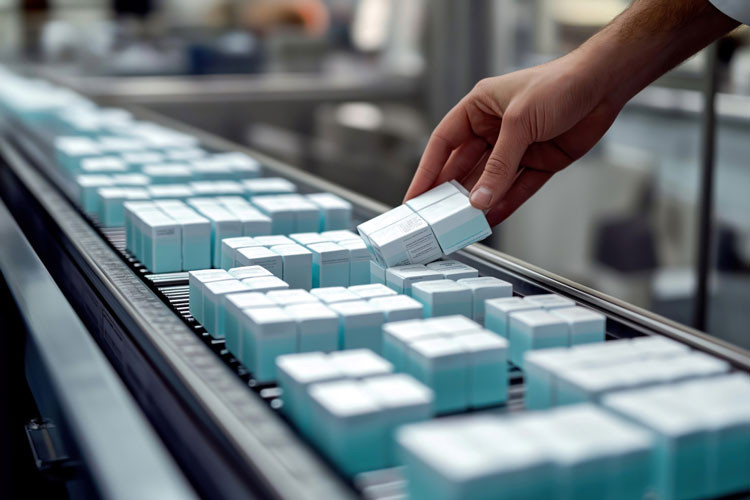Embracing flexible manufacturing to deliver personalised medicine
Insights | 04-06-2025 | By Electropages

Key Takeaways:
- Personalised Medicine Requires Flexible Manufacturing: The shift toward personalised treatments, driven by advances in genomics and biotechnology, demands manufacturing systems that can handle small, variable batches with high precision – something traditional mass production lines cannot support.
- Modular Automation Enables Scalability and Adaptability: Flexible manufacturing systems, particularly those based on modular automation, allow for rapid switching between different products and batch sizes. This adaptability is vital for pharmaceutical companies responding to the diverse needs of individualised treatments.
- Automation Ensures Compliance and Quality Control: Advanced automation solutions provide real-time monitoring, complete traceability, and automated documentation – key elements in meeting strict pharmaceutical regulatory standards.
- Innovative Transport Technologies Support Personalisation at Scale: Transport systems enable independent, contactless, and customisable movement of products. These technologies make it feasible to handle individual product variants efficiently on the same line, supporting the scale-up of personalised medicine without sacrificing precision or sterility.
Pharmaceutical companies worldwide are significantly increasing their investment in more personalised approaches to treatment. In fact, 42% of all drugs currently in development are associated with personalised medicine. Here, Stephen Hayes, managing director at automation and control specialist, Beckhoff UK, explains how flexible manufacturing systems, supported by advanced modular automation solutions, can fulfil the demands of personalised medicine.
Personalised medicine represents a shift from the one-size-fits-all approach towards more individualised treatments. This change is driven by advances in genomics, biotechnology, and data analytics, permitting treatments to be customised based on a patient's genetic profile, lifestyle and specific disease characteristics.
However, personalised medicine demands a completely different approach to production when compared to conventional mass production models. This creates new challenges for pharmaceutical manufacturers, as they must now produce highly variable products in smaller batches while adhering to strict regulatory standards for quality and safety.
To successfully meet these demands, manufacturing systems must be highly flexible, scalable, and adaptable. Conventional production lines designed for mass manufacturing lack the necessary versatility to handle the complex and dynamic nature of personalised medicine. This is where flexible manufacturing systems come into play.
Agile production
Flexible manufacturing systems are developed to handle variations in product design, batch size and production processes with minimal reconfiguration. They allow manufacturers to switch between different product lines rapidly, making them ideal for the personalised medicine sector where variability is the norm rather than the exception.
Flexible manufacturing systems are characterised by modularity, allowing different components of the system to be reconfigured or replaced as required. This modular approach supports adaptability and also improves scalability, allowing manufacturers to expand production capacity in response to changing demands quickly.
Key to the success of flexible manufacturing systems is automation. Advanced modular automation solutions, like those supplied by Beckhoff, offer the tools needed to optimise flexible manufacturing processes. These systems can handle complex, multi-step production processes, reduce human error, and maintain compliance with regulatory standards.
Regulatory compliance
Automated systems must not only ensure precision in manufacturing but also offer complete traceability, documentation, and validation.
Automation can support compliance and tracing by allowing for integrated data acquisition and real-time monitoring. For instance, TwinCAT from Beckhoff enables continuous data recording and analysis throughout the production process, ensuring that all steps are fully documented and can be traced back if necessary. This is essential for meeting regulatory requirements and ensuring the quality of the product.
Beckhoff's PC-based control systems also provide integrated support for Good Manufacturing Practices guidelines, which are vital for ensuring the safety and efficacy of pharmaceutical products. By automating documentation and quality control tasks, these systems lower the risk of human error and ensure that all products meet the necessary standards.
Personalisation at scale
Beckhoff's eXtended Transport System (XTS) and XPlanar systems are two prime examples of how advanced automation can support the demands of personalised medicine.
The XTS is an intelligent linear transport system that delivers unprecedented flexibility in motion control. It allows for the independent movement of individual carriers on a linear track, meaning that each product can be handled differently depending on its specific requirements.
This is especially valuable in personalised medicine, where different patients might need slightly different formulations or packaging. XTS allows pharmaceutical manufacturers to efficiently manage multiple product variants on the same production line, ensuring that each product is treated individually while maintaining high throughput.
Similarly, the XPlanar system delivers magnetic levitation-based transport of objects on a flat plane, permitting thecompletely contactless and flexible movement of products. The system is highly adaptable, allowing individual processing steps to be customised dynamically without the need for mechanical reconfiguration. In the context of personalised medicine, XPlanar's ability to move and manipulate products without physical contact ensures a high level of sterility and precision, both of which are critical for compliance with regulatory standards.
As the demand for personalised medicine continues to grow, pharmaceutical manufacturers must adopt flexible manufacturing systems supported by advanced modular automation solutions. Beckhoff UK's comprehensive range of products, including EtherCAT, PC-based control, XTS and XPlanar, offer the flexibility, precision and compliance needed to meet these new manufacturing challenges.
By integrating these solutions into their production lines, manufacturers can not only improve efficiency and scalability but also ensure that they are well-positioned to deliver the personalised treatments of the future while maintaining the highest standards of quality and compliance.

